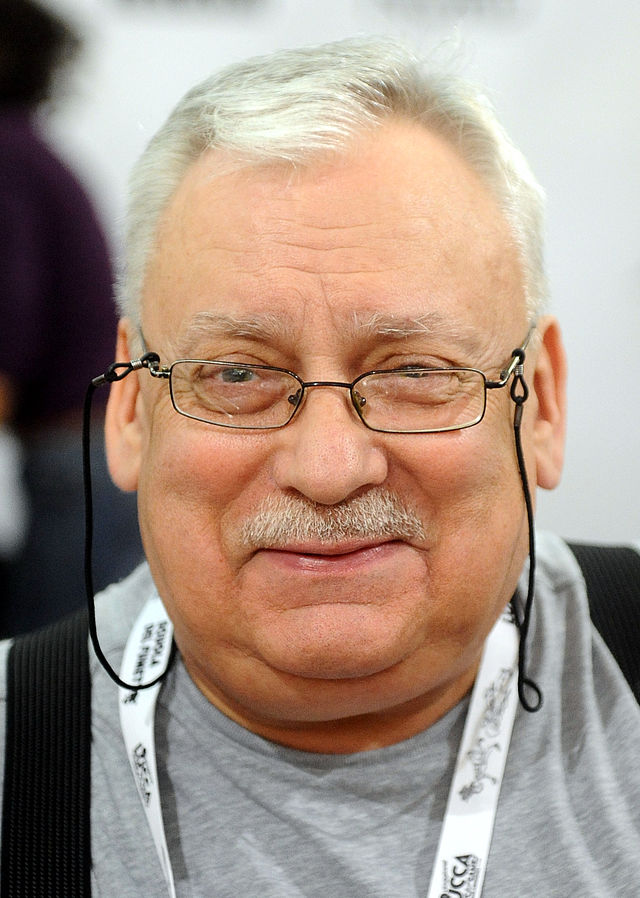
ANDRZEJ SAPKOWSKI (b. 1948)
“An economist by education, Sapkowski worked in foreign trade from 1972-94. He is a five-time winner of the Janusz A. Zajdel Award, the most important honour for fantasy writers in Poland. He received Polityka magazine’s Literature Passport in 1997. What’s more, Sapkowski’s popularity is not limited to Poland; his novels have been translated into Russian, English, Czech, German, Korean and Chinese. The English translation of his novel, Blood of Elves, received the David Gemmel Fantasy Award in June 2009.”- Culture.pl
“How The Witcher Plays with Polish Romanticism” by Paweł Schreiber, 2017.
“Andrzej Sapkowski’s Witcher Books in Order,” Hachette.
THE WITCHER SERIES
*books are listed in the reading order recommended by the publisher
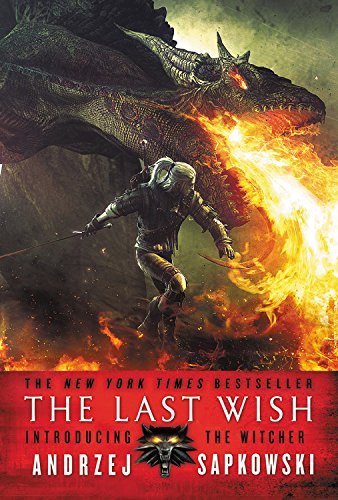
The Last Wish (1993), translated by David French (Gollancz, 2007).
“Geralt the Witcher—revered and hated—is a man whose magic powers, enhanced by long training and a mysterious elixir, have made him a brilliant fighter and a merciless assassin. Yet he is no ordinary murderer: his targets are the multifarious monsters and vile fiends that ravage the land and attack the innocent. But not everything monstrous-looking is evil and not everything fair is good… and in every fairy tale there is a grain of truth.”
Stories include: “The Voice of Reason” (1993), “The Witcher” (1986), “A Grain of Truth” (1989), “The Lesser Evil” (1993), “A Question of Price” (1993), “The Edge of the World” (1993), “The Last Wish” (1993)
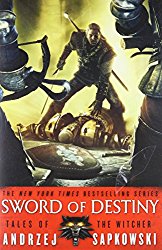
The Sword of Destiny (1992), translated by David French (Orbit, 2015).
“A second collection of stories that occur before the main Witcher novels, but feature major characters from the series, including one that features Ciri, and a second story with Ciri that details events happening right before the first Witcher novel, Blood of Elves.”
Stories include: “The Bounds of Reason”, “A Shard of Ice”, “Eternal Flame”, “A Little Sacrifice”, “The Sword of Destiny”, “Something More”
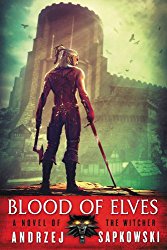
Blood of Elves (Witcher #1), translated by Danusia Stok (Gollancz, 2008).
“For over a century, humans, dwarves, gnomes, and elves have lived together in relative peace. But times have changed, the uneasy peace is over, and now the races are fighting once again. The only good elf, it seems, is a dead elf. Geralt of Rivia, the cunning assassin known as The Witcher, has been waiting for the birth of a prophesied child. This child has the power to change the world – for good, or for evil. As the threat of war hangs over the land and the child is hunted for her extraordinary powers, it will become Geralt’s responsibility to protect them all – and the Witcher never accepts defeat.”
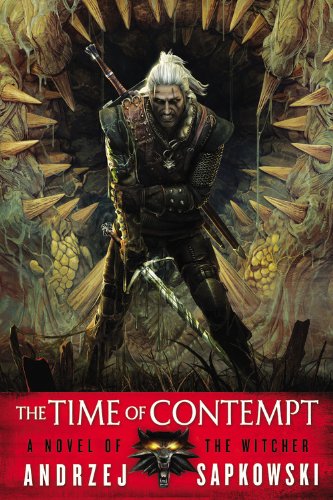
The Time of Contempt (Witcher #2) translated by David French (Gollancz, 2013).
“Geralt is a witcher: guardian of the innocent; protector of those in need; a defender, in dark times, against some of the most frightening creatures of myth and legend. His task, now, is to protect Ciri. A child of prophecy, she will have the power to change the world for good or for ill — but only if she lives to use it.“
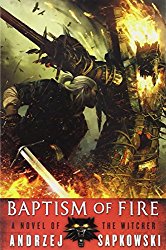
Baptism of Fire (Witcher #3) translated by David French (Gollancz, 2014).
“The Wizards Guild has been shattered by a coup and, in the uproar, Geralt was seriously injured. The Witcher is supposed to be a guardian of the innocent, a protector of those in need, a defender against powerful and dangerous monsters that prey on men in dark times. But now that dark times have fallen upon the world, Geralt is helpless until he has recovered from his injuries. While war rages across all of the lands, the future of magic is under threat and those sorcerers who survive are determined to protect it. It’s an impossible situation in which to find one girl – Ciri, the heiress to the throne of Cintra, has vanished – until a rumor places her in the Niflgaard court, preparing to marry the Emperor. Injured or not, Geralt has a rescue mission on his hands.”
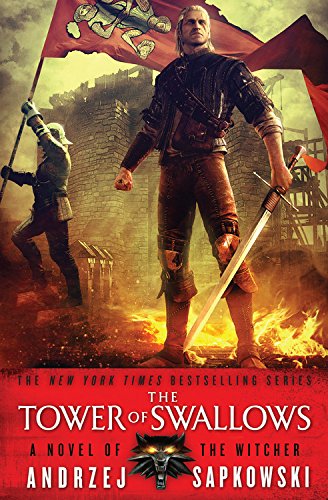
The Tower of Swallows (Witcher #4) (1997), translated by David French (Orbit, 2016).
“The world has fallen into war. Ciri, the child of prophecy, has vanished. Hunted by friends and foes alike, she has taken on the guise of a petty bandit and lives free for the first time in her life. But the net around her is closing. Geralt, the Witcher, has assembled a group of allies determined to rescue her. Both sides of the war have sent brutal mercenaries to hunt her down. Her crimes have made her famous. There is only one place left to run. The tower of swallows is waiting.”
 The Lady of the Lake (Witcher #5) (1999), translated by David French (Orbit, 2017).
The Lady of the Lake (Witcher #5) (1999), translated by David French (Orbit, 2017).
“After walking through the portal in the Tower of Swallows while narrowly escaping death, Ciri finds herself in a completely different world… an Elven world. She is trapped with no way out. Time does not seem to exist and there are no obvious borders or portals to cross back into her home world. But this is Ciri, the child of prophecy, and she will not be defeated. She knows she must escape to finally rejoin the Witcher, Geralt, and his companions – and also to try to conquer her worst nightmare. Leo Bonhart, the man who chased, wounded and tortured Ciri, is still on her trail. And the world is still at war.”
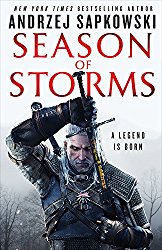 Season of Storms (2013), translated by David French (Orbit, 2018).
Season of Storms (2013), translated by David French (Orbit, 2018).
“This is not a continuation of The Witcher book series, but a sidequel, using characters from the original books to portray a whole new adventure. In Season of Storms, a contract goes wrong, and Geralt of Rivia loses the weapons he needs to kill monsters. He must work fast to get them back, before his enemies make use of his vulnerability.”
from THE HUSSITE TRILOGY

The Tower of Fools, translated by David French (Orbit, 2020).
“Reinmar of Bielawa, sometimes known as Reynevan, is a healer, a magician, and according to some, a charlatan. When a thoughtless indiscretion forces him to flee his home, he finds himself pursued not only by brothers bent on vengeance but by the Holy Inquisition. In a time when tensions between Hussite and Catholic countries are threatening to turn into war and mystical forces are gathering in the shadows, Reynevan’s journey will lead him to the Narrenturm — the Tower of Fools. The Tower is an asylum for the mad…or for those who dare to think differently and challenge the prevailing order. And escaping it, avoiding the conflict around him, and keeping his own sanity will prove more difficult than he ever imagined.”
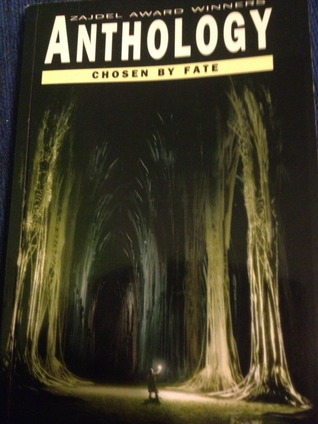
from Chosen by Fate
“Hexer,” translated by ?
 from A Polish Book of Monsters
from A Polish Book of Monsters
“Spellmaker” (1986), translated by Michael Kandel
